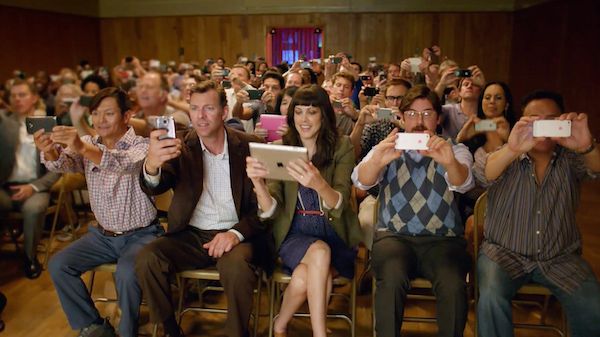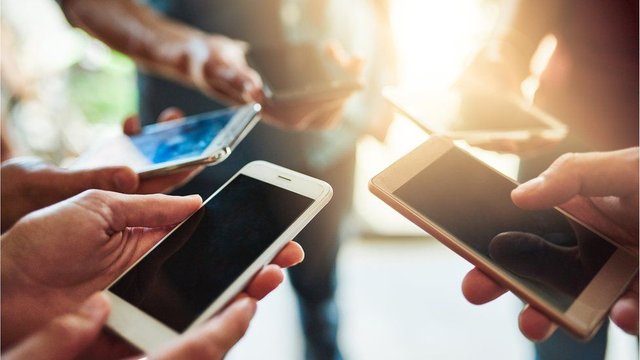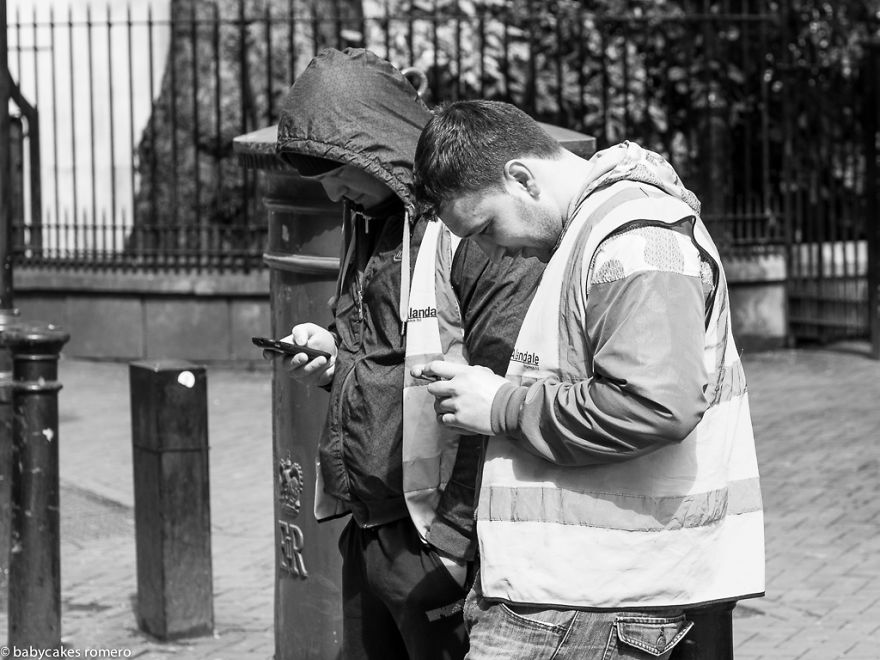I read this article yesterday that discussed, yet again, the deleterious effects of the Almighty Smartphone.
But they are still right. And we aren't listening, are we?

What was particularly interesting about this article was its focus not on its time-swallowing chasm-like quality, or its obvious anti-socializing effects, but rather that it has effects on our mental capacity simply by being in the same room with us--even if we don't check it, even if we don't think to check it, even if we don't hear it, even if we can't see it.
That's outrageous.
Essentially, what studies have been finding is that it has taken up definitive space in our minds and pathways such that it continues to occupy space in us every hour of every day; it is keeping us awake to it at all times, pulling on us like a force field. It makes me curious about what's happening in relation to it when we sleep.
Because of this bandwidth being taken up in us constantly by our phones, we are actually underperforming. When this underperformance is habitual, the pathways in our brains also begin to alter, and, voila, we are now dumber.
Exciting.
I am a notoriously unabashed open-browsers/open-apps kind of girl, and we all know the effects that has on the speed and computing power of our devices. I think a similar thing is going on with us and our phones.
So what do we do?

I have been feeling the effect dramatically for a long time, especially because I almost completely missed the first big cultural explosion of The Smartphone. I actually had one, but hardly ever used it except for a phone call here and there; I didn't use it like a smartphone really at all.
I lived on a small campus in the Austrian countryside that was tight-knit and residence-building based, and for the most part we would just go over and knock on each others' doors if we needed something. I texted as well here and there (nothing like now), but also hardly even used my data because I didn't full understand it and as a student at the time didn't want to get charged; I was also mostly off of Facebook and didn't have Instagram--and was an extremely busy grad student. Everyone I lived around, studied with, socialized with was very similar, and many of the students were quite poor as well, so it just wasn't our culture to be phone-based, especially as it was still comparatively new. We really lived reality in the deepest sense (I have not often been as grateful for that time as I certainly should be now.)
When I came back, I didn't really want a smartphone and didn't feel I needed it, so I didn't get one.
But it's hard to explain my shock and sadness and disgust when I came back to everyone else glued to theirs. Because it hadn't snuck up on me like everyone else, I felt the strong shift from the attention of my friends and family to the painfully divided version of it--the constant glances at the phone, the holding it without necessity, the many "just a sec I need to check something" moments. It didn't feel normal--it only felt rude and disappointing.

In general, I could feel the intellectual attention climate had shifted dramatically as well in my time away (I had been gone for about 3 years between 2010 and 2013, living in this school community), and it grieved me. Not only had I not been subject to that dramatic cultural shift, I had instead been wading through thick physical texts rife with philosophical inquiry and questions about ethics, virtue, and existence--so I had been moving in the other direction from the general culture. I was becoming more attentive in that time.
But the reason I share all this is not to be on a high horse; it has a tragic and predictable ending.
I got my own smartphone in fall of 2014, and rapidly accustomed myself to this new way of being. And I watched my own attention and relational capacities diminish in painful ways.
I have fought ever since to try to remain plugged into reality, and able to fight through books, but have to admit my attention is dwindling constantly. It is a real fight. And so I've grown to have a deep sadness and sympathy for us all who are losing so much without even realizing it; our mental capacities are actually shrinking, and our ability to engage in serious and critical thought is disappearing.

I find this most decisively in the important cultural conversations we need to be having--very few people are able and willing to enter into actual, nuanced dialogue about real concepts. Very few people seem capable of conceding rational points in an argument--and this wasn't the same a few years ago. I especially see it in the very young; their brains are solidifying and growing to accommodate the constant rush of tech, and we are seeing mental health issues abound like never before.
So: what do we do? Is it a lost cause?

I am open to suggestions.
I have been seriously contemplating something dramatic, although I really don't know if I will have the courage and ability to implement it. Combined with the rapidly increasing security questions (I'm pretty over my verbal conversations around my phone equalling a perfectly-tailored Google ad), I am wanting to limit my phone use. This is admittedly hard as we all quickly became dependent.
My new consideration is to look into one of those security-feature cases that block all signals (tell me: does that mean phone calls and messages won't come in after? Probably.. which makes it likely not work) and then have assigned times of the day where I check it/return calls and messages/do some social media things. And then put it away again.
Or, perhaps? Get another phone with no internet connection for my texting and calls.
Along with finding ways to temper use, I think we also need to focus on continuing to be readers--to read a book for a full hour every day or two without a distraction--and to spend time with friends/family and leave the phone behind, or at least out of site, for a few hours at a time. I am still able to do these things without too much stress or difficulty, but also realize I can't take that for granted; these days, we have to consciously choose to keep our freedom--to not be complete slaves to a piece of tech.
I don't know about you, but I don't want to get dumber. And the ones who consciously keep their minds and hearts free--at least relatively--will only see the personal and relational benefits of this increasingly more as the years go on.
Thoughts?
xx,
Kay
.
.
.
.
.
I'm actually on here primarily as a musician. You can hear me sing here - a cover of a song I love!
It truly is one among the many first world problems we have. I don’t allow phones during dinner and if we go out phones are to be put away. I love conversation and if everyone is glued to their phone this would be lost. It saddens me when I go out to see others glued to their phones rather than paying attention to those in their party.
Downvoting a post can decrease pending rewards and make it less visible. Common reasons:
Submit
Not sure how I missed responding to this! Yes! I am the same way; something just hurts when everyone is on their phone rather than talking to each other!
Downvoting a post can decrease pending rewards and make it less visible. Common reasons:
Submit
I feel ya friend! Happy Saturday to you!
Downvoting a post can decrease pending rewards and make it less visible. Common reasons:
Submit
Don't have a smartphone, and don't plan to get one.
Tired of the my phone has this and that, all I want is built-in flashlight and ability to call other people...
Downvoting a post can decrease pending rewards and make it less visible. Common reasons:
Submit
That's amazing! You win in this game, for sure.
Downvoting a post can decrease pending rewards and make it less visible. Common reasons:
Submit
It's nearly impossible to use well.
Downvoting a post can decrease pending rewards and make it less visible. Common reasons:
Submit
I can't think of a better post to be my very first resteem, great post @kayclarity.
Downvoting a post can decrease pending rewards and make it less visible. Common reasons:
Submit
Awesome! Thank you! :D
Downvoting a post can decrease pending rewards and make it less visible. Common reasons:
Submit